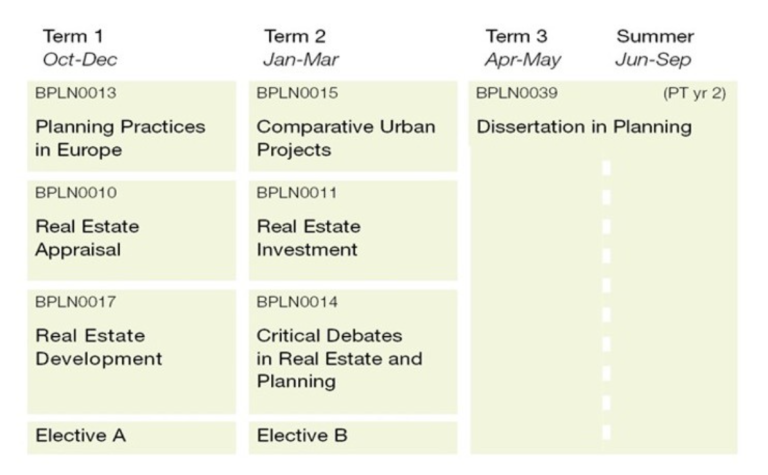The International Real Estate and Planning MSc/Dip focuses on the relationship between the property development process and the planning systems of Europe and beyond.

About the course
The International Real Estate and Planning MSc/PGDip explores the systems through which urban planning and property development operate, including market mechanisms, ownership frameworks, taxation and subsidy, land use, and policy planning. We also consider market mechanisms from the perspective of investors, developers and occupiers of buildings, and the relationship between markets and policy at various geographical levels.
When you study on the International Real Estate and Planning MSc/PGDip, you will learn through lectures and seminars, project work and a dissertation. We aim to give you an understanding of the range of variation across national boundaries, and theoretical and practical knowledge that can be applied internationally.
Why choose to study international real estate and planning at The Bartlett?
We offer you:
- An opportunity to acquire a broad range of skills and knowledge, while setting foot on the path towards specialisation
- A principle- and theory-driven course giving both conceptual understanding and the skills needed to tackle practical problems
- The Bartlett, UCL’s Faculty of the Built Environment, has been ranked #1 in the world in the Architecture and Built Environment field in 2023, according to the QS World University Subject Rankings.
- UCL is ranked among the top 10 universities worldwide for the 12th year running, in the 2024 QS World University Rankings and has been named The Times and Sunday Times 'University of the Year' 2024.
Who should apply?
We welcome applications from individuals who wish to practise international real estate and planning internationally, and to break the boundaries between built environment professions.
Course structure
To complete the International Real Estate and Planning postgraduate diploma, we require you to take and pass 180 credits of core and elective modules. The programme consists of six 15-credit modules of core studies and another 30 credits of elective courses. If you are completing the MSc degree then you will write a 60-credit dissertation.
The following diagram illustrates the structure of the International Real Estate and Planning MSc in each term:

To complete the International Real Estate and Planning MSc, we require you to take and pass six core modules (90 credits) and two optional modules (30 credits) over nine months when studying full-time.
- Read more about our core modules
- Real Estate Appraisal (15 credits)
- Planning Practices in Europe (15 credits)
- Real Estate Development (15 credits)
- Critical Debates in Real Estate and Planning (15 credits)
- Comparative Urban Projects (15 credits)
- Real Estate Investment (15 credits)
- Dissertation in Planning (60 credits)
- Read more about our optional modules
If you wish to pursue RTPI accreditation and do not hold an accredited first degree, you must take the following modules:
- Planning Practice
And a choice of one of the following two modules:
- Spatial Planning: Concepts and Context
- Comparative Planning Systems and Cultures
Specialise in a subject area relating to international real estate and planning
In addition to the range of optional modules (also known as elective modules) on offer across The Bartlett Faculty of the Built Environment (subject to availability), you can use your optional modules to specialise in subject areas offered by the The Bartlett school of Planning in more depth. Our specialisms operate best in module pairs, but many of these modules can also be taken as standalone units.
Our specialism topics at The Bartlett School of Planning include:
Infrastructure Planning:
This specialism consists of two modules addressing the question 'what constitutes a successful infrastructure project, programme or plan'. The first module 'Infrastructures as Agents of Change' defines the characteristics of infrastructure projects, programmes and plans of various kinds and examines their roles as agents of change. It encompasses an understanding of past perspectives of the role of such investments and investigates 21st century perspectives in a context of global interdependencies of economic growth and environmental impacts as sustainability concerns loom large as key challenges. The second module 'Critical Issues in Infrastructures Funding, Finance and Investment' focuses on issues that cross all infrastructure sectors in the developed and developing world. It examines challenges seen to be critical to sustainable investments. While not exhaustive, the module examines the: role of PPPs, impacts of corruption, Section 106 & Community Infrastructure Levy, Property value uplift and Tax Incremental Financing and impact of fiscal devolution.
Investigating Urban Transformation in Historic Cities:
This specialism provides interdisciplinary theoretical and practical tools to investigate the context and dynamics of urban transformation in historic cities. The two modules, 'Planning Discourses for Historic Cities' and 'Planning Practices in Historic Cities', analyse planning processes - both discourses and practices - used to conceptualise and regulate the rate and direction of physical change in historic urban environments. The specialism is open to students from different backgrounds and Masters programmes who are passionate about querying the complexities of urban conservation and development from different perspectives (research, policy, design and practice).
Planning for Housing:
This specialism examines the context for and process of residential development in the UK and is divided into lecture-based and project-based components. The lecture-based component, 'Planning for Housing: Process', begins by looking at the drivers of residential development including the demographics of growth. It considers who provides housing and at the evolution of the UK policy context and its current objectives. The component then looks at the residential development process from strategic and development planning, land acquisition to the occupation of homes under different tenure arrangements. The lecture programme is divided into three parts: concerned firstly with broad perspectives on housing growth, policy and planning; secondly, with housing providers, processes and delivery; and thirdly, with critical debates and outcomes today. The project-based component, 'Planning for Housing: Project', challenges students to apply and extend their knowledge of development drivers, actors and practices to real-life housing development opportunities in London. Via small group organisation, students will co-ordinate the completion of a comprehensive feasibility study and housing development brief for a specific site. Groups will be allocated strategic mandates reflecting the current policy context and objectives explored in 'Planning for Housing: Process' and will then plan, design and initiate the implementation of a development scheme from a selected development actor perspective, reflecting tenure, design, and organisational intentions. Schemes will be collectively proposed and managed and then presented by each team to an audience of peers, staff and relevant experts in the field.
Planning for Sustainability, Climate Change and Inclusion Planning for Urban Design:
This specialism looks at the inter-related themes of sustainability and inclusion. In the term one module 'Planning for Sustainability and Inclusion', a variety of conceptual issues surrounding the governing process for achieving urban sustainability are examined alongside the challenges involved in defining and achieving inclusion in the planning process. Students then have a choice in term two. If they wish to focus more on environmental sustainability and, in particular, the climate emergence, they can take 'Sustainability, Resilience and Climate Change'. If they wish to delve further into the problematics of inclusionary planning, they can take the 'Participatory Urban Planning Project'. Both of the term two modules take the form of a project, pursued through teamwork and in collaboration with external stakeholders.
Planning for Urban Design:
This specialism considers design across a range of different scales of operation, from those dealing with settlement form, to those dealing with land use mix, to those concerned with detailed design and individual site layout and comprises 'Urban Design: Density and Form' and 'Urban Design Governance'. To that extent planning is undoubtedly a design discipline and planners need to be aware of, and be concerned with, the design consequences of their decisions on the ground. To explore this role, the Urban Design Specialism is divided into two parts, reflecting the two primary means through which planners engage in urban design – first as members of collaborative design teams, who critique and advise on design proposals, and second as policy and guidance writers. Part one examines the design process through analysis, critique and the generation of alternatives for site-specific design projects. Part two addresses the process of design guidance writing and implementation.
Smart City Theory and Practice:
Run by UCL’s Centre for Advanced Spatial Analysis (CASA), these modules give you an introduction to the theory and science of cities, and technological perspectives on ‘smart cities’. Term one deals with more general perspectives on cities developed by urban researchers, systems theorists, complexity theorists, urban planners, geographers and transport engineers will be considered, such as spatial interactions and transport models, urban economic theories, scaling laws and the central place theory for systems of cities, etc. Term two then looks more specifically at the development of smart cities through a history of computing, networks and communications, of applications of smart technologies, ranging from science parks and technopoles to transport based on ICT. The course will cover a wide range of approaches, from concepts of The Universal Machine, to Wired Cities and sensing techniques, spatio-temporal real time data applications, smart energy, virtual reality and social media in the smart city, to name a few. Overall, students will develop a critical approach to more technological and quantitative understandings of the development and management of cities.
Sustainable Development Themes and Goals:
This pair of modules is concerned with sustainable development in relation to the theory of urban development and spatial planning practice in cities associated with sustainable development goals. The first module 'Sustainable Urban Development: Key Themes' focuses on sustainability debates and literature, with a specific focus on cities. The second, 'Sustainable Development Goals and Spatial Planning', explores how the Agenda 2030 and Sustainable Development Goals (SDGs) are implemented at the local or municipal level in cities.
Urban Regeneration:
This specialism is concerned with innovation, urban and regional economic development and regeneration and comprises two modules – 'Urban Regeneration: Urban Problems and Problematics' (term 1) and 'Delivering Regeneration Projects II' (term 2). The issues are analysed in the context of development economics, the new space economy, the agglomeration of innovative high-technology industries, the concepts of the innovative and creative milieu and emerging forms of urban governance. These analyses are brought to bear on project work, which allows for the examination of the relationship between those broad trends and specific local contexts and processes. The specialism comprises 2 modules: the first focuses on the theoretical framework for the understanding of the spatial and socio-economic dynamics of contemporary cities, the second is structured around a project in which students are invited to apply the theory and develop their own strategies for the regeneration of a locality.
More details of these modules can be found in the UCL module catalogue.
Please note that the course structure and list of modules given here is indicative. This information is published a long time in advance of enrolment and module content and availability are subject to change.
Field trips
Our course also includes a residential field trip during which themes relevant to the course are explored in different place contexts. This is an opportunity for our students to consider built environment issues in real world settings and network as a course community. The cost of travel and accommodation for the field trip are covered by UCL although students will need to cover meals and other personal expenses.
Careers and employability
Graduates of the International Real Estate and Planning MSc have been very successful in gaining subsequent employment, and at present there is a growing demand for our master's graduates from a wide range of both public and private employers, with our graduates particularly pursuing careers as commercial real estate surveyors or planning consultants.
Our course prepares students both theoretically and practically to practise across international boundaries in the fields of urban policy, planning, real estate market analysis and property valuation, investment and development. Our students develop the necessary skills, knowledge and aptitudes to become creative, problem-solving professionals and to cooperate and engage creatively with others as both team members and team leaders. We also equip our students to engage in research, policy and regulatory activities relating to the field.
Staff
- Programme Director
William Walton
Associate Professor in Urban Planning Law
View William's profile- Teaching staff
Elena Besussi
View Elena's profileDr Jessica Ferm
View Jessica's profileDr Tommaso Gabrieli
View Tommaso's profilePeter McLennan
View Peter’s profileDr Susan Moore
View Susan's profileProfessor John Tomaney
View John’s profile
 Close
Close


